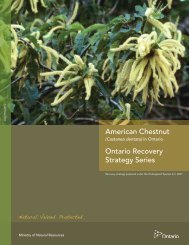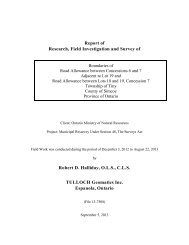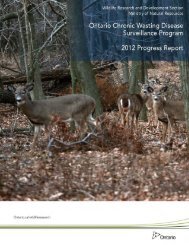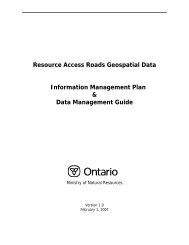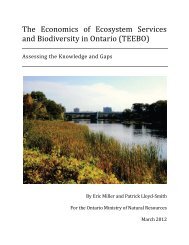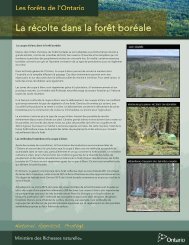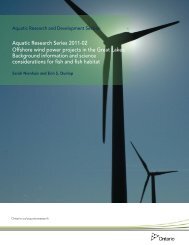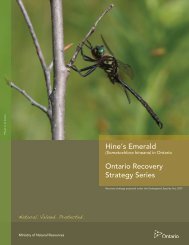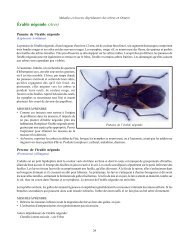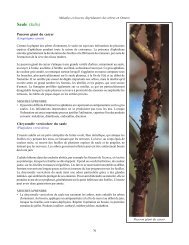Ontario's Natural Heritage Areas - Ministry of Natural Resources
Ontario's Natural Heritage Areas - Ministry of Natural Resources
Ontario's Natural Heritage Areas - Ministry of Natural Resources
Create successful ePaper yourself
Turn your PDF publications into a flip-book with our unique Google optimized e-Paper software.
In this context, some National Parks are preparing<br />
greater park ecosystem plans (Roszell, 1996).<br />
In 1998, the Government <strong>of</strong> Canada appointed<br />
the Panel on the Ecological Integrity <strong>of</strong> Canada’s<br />
National Parks to recommend how best to ensure<br />
that ecological integrity is maintained across the<br />
system <strong>of</strong> National Parks. The Panel reported that a<br />
number <strong>of</strong> natural values in Canada’s National Parks<br />
are in jeopardy, and provided 127 recommendations<br />
to help Parks Canada reverse the trend (Parks<br />
Canada Agency, 2000a, b). In response, Parks Canada<br />
embarked upon a nation-wide consultation process<br />
and completed an action plan to address the Panel’s<br />
recommendations. The action plan focused on:<br />
• Making ecological integrity central in legislation<br />
and policy.<br />
• Building partnerships for ecological integrity.<br />
• Planning for ecological integrity.<br />
• Renewing Parks Canada to support the<br />
ecological integrity mandate (Parks Canada<br />
2001a:3).<br />
Legislation and Policy Basis<br />
The National Parks Act governs the establishment<br />
and management <strong>of</strong> National Parks. The most<br />
current version <strong>of</strong> this Act strengthens the ecological<br />
integrity clause. In fact, ‘ecological integrity’ is the<br />
cornerstone <strong>of</strong> management programs implemented<br />
under the National Parks Act, which states that<br />
“maintenance or restoration <strong>of</strong> ecological integrity,<br />
through the protection <strong>of</strong> natural resources and natural<br />
processes shall be the first priority <strong>of</strong> the Minister<br />
when considering all aspects <strong>of</strong> the management <strong>of</strong><br />
parks” (Parks Canada, 2001a:5). Ecological integrity<br />
is defined as a “condition that is determined to be<br />
characteristic <strong>of</strong> its natural region and likely to persist,<br />
including abiotic components and the composition<br />
and abundance <strong>of</strong> native species and biological<br />
communities, rates <strong>of</strong> change and supporting<br />
processes” (Parks Canada, 2001a:5).<br />
Where new National Parks are established in<br />
conjunction with the settlement <strong>of</strong> land claims <strong>of</strong><br />
Aboriginal peoples, final boundaries <strong>of</strong> the park as<br />
well as harvesting rights and involvement <strong>of</strong> Aboriginal<br />
peoples in park planning and management are<br />
proposed in legislation according to the terms <strong>of</strong> the<br />
Ontario’s <strong>Natural</strong> <strong>Heritage</strong> <strong>Areas</strong> 116<br />
Image by P.A. Gray<br />
land claim agreement. In the interim, the area may<br />
be set aside as a National Park Reserve under the<br />
National Parks Act and traditional hunting, fishing,<br />
and trapping activities by Aboriginal peoples are<br />
permitted to continue. Other interim measures also<br />
may include local Aboriginal peoples’ involvement in<br />
National Park Reserve management (Parks Canada,<br />
1994:29). In addition to natural features, many National<br />
Parks contain areas that have cultural and historical<br />
significance. These areas are managed according<br />
to the Cultural Resource Management Policy (Parks<br />
Canada, 1994:24).<br />
Protection Goal and/or Objectives<br />
Maintenance <strong>of</strong> ecological integrity is the overriding<br />
goal <strong>of</strong> the National Parks program. Achievement <strong>of</strong><br />
this goal requires that Parks Canada work closely with<br />
industry, non-government organizations, individuals,<br />
and other government agencies in support <strong>of</strong><br />
ecosystem management programs that extend<br />
beyond park boundaries. The primary objective <strong>of</strong><br />
the National Parks program is “to protect for all time,<br />
representative natural areas <strong>of</strong> Canadian significance<br />
in a system <strong>of</strong> national parks, and to encourage public<br />
understanding, appreciation, and enjoyment <strong>of</strong> this<br />
natural heritage so as to leave it unimpaired for future<br />
generations” (Parks Canada, 1994:25). National Parks<br />
also contribute to other goals <strong>of</strong> the Government <strong>of</strong><br />
Canada, including efforts designed to:<br />
• Preserve the integrity, health, and biodiversity <strong>of</strong><br />
Arctic ecosystems.<br />
• Strengthen and build environmental relationships.<br />
• Provide timely, accurate, and accessible<br />
information to enable Canadians to make<br />
environmentally sensitive decisions.<br />
• Help develop an environmentally literate society.<br />
• Strengthen environmental science with special<br />
emphasis on understanding regional ecosystems.<br />
• Ensure that all operations and procedures meet<br />
or exceed national targets for sustaining the<br />
environment (Parks Canada, 1994:25).



